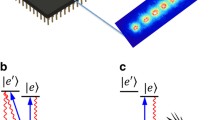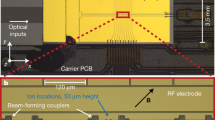Abstract
Recent advances in trapped ion technology have rapidly accelerated efforts to construct a near-term, scalable quantum computer. Micro-machined electrodes in silicon are expected to trap hundreds of ions, each representing quantum bits, on a single chip. We find, however, that scalable systems must be composed of multiple chips and we explore inter-chip communication technologies. Specifically, we explore the parallelization of modular exponentiation, the substantially dominant portion of Shor’s algorithm, on multi-chip ion-trap systems with photon-mediated communication between chips.
Shor’s algorithm, which factors the product of two primes in polynomial time on quantum computers, has strong implications for public-key cryptography and has been the driving application behind much of the research in quantum computing. Parallelization of the algorithm is necessary to obtain tractable execution times on large problems. Our results indicate that a 1024-bit RSA key can be factored in 13 days given 4300 (each of area 10 by 10 centimeters) ion-trap chips in a multi-chip system.
Preview
Unable to display preview. Download preview PDF.
Similar content being viewed by others
References
Shor, P.: Polynomial-time algorithms for prime factorization and discrete logarithms on a quantum computer. In: 35th Annual Symposium on Foundations of Computer Science, pp. 124–134 (1994)
Metodi, T.S., Thaker, D.D., Cross, A.W., Chong, F.T., Chuang, I.L.: A quantum logic array microarchitecture: Scalable quantum data movement and computation. In: Proceedings of the 38th International Symposium on Microarchitecture, MICRO-38 (2005)
Shor, P.W.: Scheme for reducing decoherence in quantum computer memory. Phys. Rev. A 54, 2493 (1995)
Steane, A.: Error correcting codes in quantum theory. Phys. Rev. Lett. 77, 793–797 (1996)
Gottesman, D.: A class of quantum error-correcting codes saturating the quantum hamming bound. Phys. Rev. A 54, 1862 (1996)
Cirac, J.I., Zoller, P.: Quantum computations with cold trapped ions. Phys. Rev. Lett. 74, 4091–4094 (1995)
Riebe, M., Haffner, H., Roos, C., et al.: Deterministic quantum teleportation with atoms. Nature 429(6993), 734–737 (2004)
Vedral, V., Barenco, A., Ekert, A.: Quantum networks for elementary arithmetic operations. Phys. Rev. A54, 147 (1996)
Beckman, D., Chari, A., Devabhaktuni, S., Preskill, J.: Efficient networks for quantum factoring (unpublished, 1996)
Meter, R.V., Itoh, K.M.: Fast quantum modular exponentiation. E-Print: quant-ph/0408006 (2004)
Cuccaro, S., Draper, T., Kutin, S., Moulton, D.: A new quantum ripple-carry addition circuit (unpublished, 2004)
Draper, T., Kutin, S., Rains, E., Svore, K.: A logarithmic-depth quantum carry-lookahead adder. E-Print: quant-ph/0406142 (2004)
Knowles, S.: A family of fast adders (unpublished, 1985)
Wootters, W., Zurek, W.: A single quantum cannot be cloned. Nature 299, 802–803 (1982)
Bennett, C.H., et al.: Teleporting an unknown quantum state via dual classical and EPR channels. Phys. Rev. Lett. 70, 1895–1899 (1993)
Bell, J.S.: On the Einstein-Podolsky-Rosen paradox. Physics 1, 195–200 (1964)
Dur, W., Briegel, H.J., Cirac, J.I., Zoller, P.: Quantum repeaters based on entanglement purification. Phys. Rev. A59, 169 (1999)
Bennett, C., et al.: Purification of noisy entanglement and faithful teleportation via noisy channels. Phys. Rev. Lett. 76, 722 (1996)
Deutsch, D., Ekert, A., Jozsa, R., Macchiavello, C., Popescu, S., Sanpera, A.: Quantum privacy amplification and the security of quantum cryptography over noisy channels. Phys. Rev. Lett. 77, 2818–2821 (1996)
Monroe, C.: Quantum information processing with atoms and photons. Nature 416, 238 (2002)
Cabrillo, C., Cirac, J., Garca-Fernndez, P., Zoller, P.: Creation of entangled states of distant atoms by interference. Phys. Rev. A 59, 1025–1033 (1999)
Blinov, B., Moehring, D., Duan, L., Monroe, C.: Observation of entanglement between a single trapped atom and a single photon. Nature 428, 153–157 (2004)
Duan, L., Lukin, M., Cirac, J., Zoller, P.: Long-distance quantum communication with atomic ensembles and linear optics. Nature 414, 413 (2001)
Nielsen, M.A., Chuang, I.L.: Quantum Computation and Quantum Information. Cambridge University Press, Cambridge (2000)
Author information
Authors and Affiliations
Editor information
Editors and Affiliations
Rights and permissions
Copyright information
© 2006 Springer-Verlag Berlin Heidelberg
About this paper
Cite this paper
Thaker, D.D., Metodi, T.S., Chong, F.T. (2006). A Realizable Distributed Ion-Trap Quantum Computer. In: Robert, Y., Parashar, M., Badrinath, R., Prasanna, V.K. (eds) High Performance Computing - HiPC 2006. HiPC 2006. Lecture Notes in Computer Science, vol 4297. Springer, Berlin, Heidelberg. https://doi.org/10.1007/11945918_16
Download citation
DOI: https://doi.org/10.1007/11945918_16
Publisher Name: Springer, Berlin, Heidelberg
Print ISBN: 978-3-540-68039-0
Online ISBN: 978-3-540-68040-6
eBook Packages: Computer ScienceComputer Science (R0)




